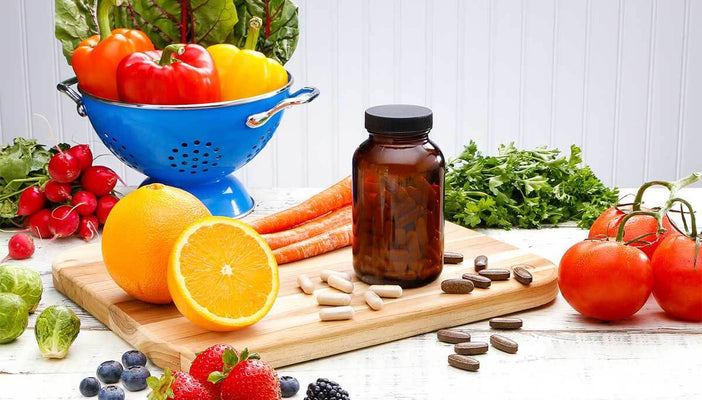Are you a new vegan parent or simply still struggling to assure your kids are meeting their vitamin requirements? You might have many questions and concerns when it comes to which vitamins are your children getting from their diet, which vitamins they should supplement, and what is the best way. Stay with us as we cover all these areas!
Is a vegan diet even healthy for children?
This might be the biggest concern you have. Many vegan parents face judgment based on the choices they make for their children, and these come not just from their friends and family, but from pediatricians as well. Therefore, it is extremely reasonable and normal to have many questions.
Maybe you haven’t had a lot of guidance yourself due to a lack of knowledge all around you. Well, let us reassure you - that vegan children can receive all the required nutrients from a balanced plant-based diet!
The keyword here is balanced. A successful vegan diet needs to cover whole foods, supplements, and fortified foods.

Which vitamins are they missing?
Theoretically, yes, it would be possible to receive everything needed just from food and beverages. However, this is very difficult so it is necessary to use supplements. They are simply needed to fill in the gaps. Without supplements, a plant-based diet would be incomplete and unbalanced.
If we were to generalize, most vegan kids would benefit from receiving supplements for Vitamin D, Vitamin B12, Iodine, and Long-chain omega-3s.
Depending on their test results, some kids might not need all four, so it is advised to check with your healthcare provider in advance!
Best ways to supplement vitamins
Unfortunately, there is not a one-size-fits-all when looking for the best way to meet the required vitamin intake. This depends on the child’s age, their place of living, and even if they are receiving formula or breastmilk.
Another factor to consider is the proportion and quality of solid plant-based foods they are eating. Online journals and food logs are helpful when it comes to keeping track of this.
If we think about it, what do kids usually love? Candy, right? Well, maybe something like that would be the yummiest way for them to receive the needed vitamins. How do sugar-free gummies sound? These are naturally packed with many vitamins, such as Vitamin A, Vitamin B12, and Vitamin E, and are suitable for all children.
Iron
Most parents are concerned about iron consumption since it is the most frequent nutrient deficiency all over the world. This vitamin is involved in many physiological functions and processes throughout our lifetime, whether we are children or adults.
Not enough iron causes a decrease in red blood cells, needed to carry oxygen, which can lead to heavy fatigue, and delayed development and growth. Iron-containing supplements are usually the best way to ensure this iron deficiency anemia is avoided.
Vitamin D
Vitamin D’s nickname is “the sunshine vitamin” since we absorb it from our skin being directly exposed to sunlight. Unfortunately, many of us aren’t lucky to have sun exposure all year round, and even then, vitamin D deficiencies tend to occur.
Plant-based kids do not receive enough of it on their plates since the foods containing vitamin D are usually animal-based foods, such as dairy and fish.
Even so, the recommended SPF for kids also limits the absorption of this vitamin. That’s why citrusy Vitamin D supplements are also advised in this situation.

Vitamin B-12
Even the birds are chirping about Vitamin B-12 at this point, considering how many people are talking about it being a deficiency for vegans. It’s one of those vitamins that people easily absorb from diets rich in animal protein.
Sure, supplements come in handy again, but even Vitamin B-12 fortified plant-based milk can be a good source. However, these aren’t reliable due to low absorption rates. Do not worry, because Vitamin B-12 is easily accessible and inexpensive.

Omega 3s
Omega 3 fatty acids might sound intimidating, since we have all learned in school they are only available through seafood and dairy.
It’s true that they are best found in eggs, milk, fish, and other seafood, but science has advanced and nowadays many algae-based supplements assure your kids will not be lacking anything!
Food first, supplements later
Keep in mind that supplements are there to do just that - supplement a nutrient-rich diet, not replace it. Along with knowing which supplements to incorporate, it is also crucial to know how to correctly feed your child, whichever diet they are following.
Supplements don’t come fully risk-free. It is important to only intake trusted products since many of those cheap versions can do more harm than good because their content differs from what is on the ingredients list. They might even be corrupted with harmful compounds.
This is why a food-first approach is the way to reduce risk and minimize the amount of vitamins your child needs to be supplemented.
Another tip is to purchase products from brands working with third-party labs that do the testing. They confirm the ingredients list matches the actual content of the product.
Many brands also offer support if you find that one supplement does not work for you or your child, and you would like an alternative.
CONCLUSION
A varied, well-balanced, plant-based diet has many perks and assures the satisfaction of numerous nutrients. However, when making sure your children are optimally growing and developing, some supplements are needed. Keep your children’s best in mind when choosing which brands to buy from, and try going for some yummy, chewy products. Before taking any of these steps, make sure to consult with your healthcare provider first.


